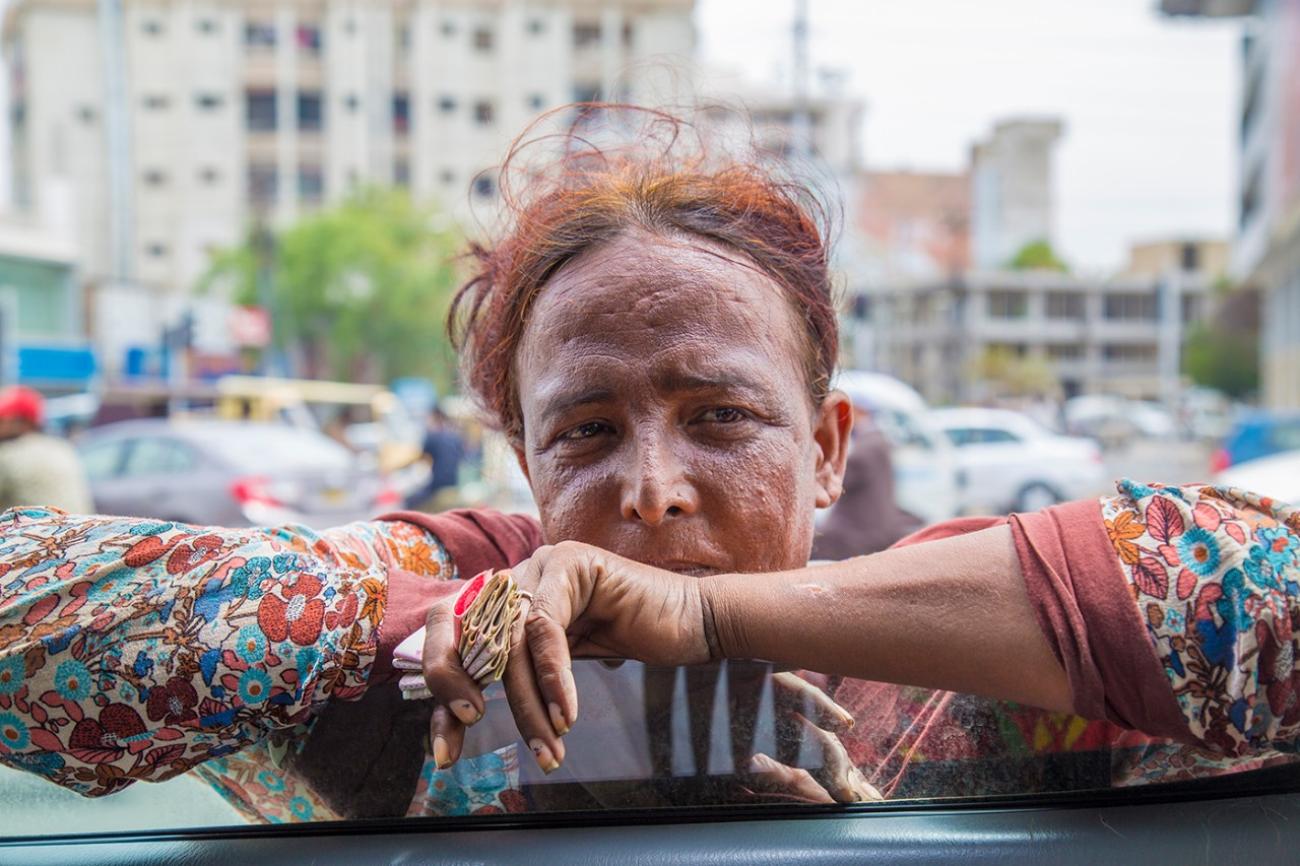Social inclusion of vulnerable transgenders in times of COVID-19

Amid COVID-19, Assistance provided to the most vulnerable transgender persons living in Islamabad and Rawalpindi.
Continuing with its commitment to ‘Leave No One Behind’, UNDP in Pakistan, with UNFPA’s support, conducted a rapid preliminary socio-economic assessment to gauge the impact of the COVID-19 pandemic on transgender persons living in the twin cities of Islamabad and Rawalpindi.
This initiative is the first outcome of the Ministry of Human Rights (MoHR) and UNDP Human Rights Taskforce on COVID-19 for collaboration on efforts through a human rights lens.
The assessment was conducted with representative sampling of 75 transgender persons (50 individuals in Rawalpindi and 25 in Islamabad), through transgender focal points of Islamabad and Rawalpindi— who are also members of the National Implementation Committee of the Transgender Persons (Protection of Rights) Act 2018. The Ministry of Human Rights (MoHR) was on board to ensure ownership from the government.
All geographical areas of Islamabad and Rawalpindi were a part of the assessment while the assessment itself was disaggregated along multiple categories including, but not limited to, key-informants’: age, disability if any, health status, pre-COVID19 employment/income generation capacity, residence, and any experience of Gender Based Violence (GBV)).
The sample-size was loosely based on Census 2017-18 findings[1] and in consultation with the trans-community, measuring at 50 key informants from Rawalpindi and 25 key informants from Islamabad-ICT. The findings of the assessmnet reveal serious socio-economic impact of the already marginalised communities of trangender persons; with limited mobility due to COVID-19, their earnings have declined considerably and they are facing issues of shelter, food and access to mandatory hygiene products such as masks, gloves and sanitizers.

National Consultation in 2018 on Political inclusion and Electoral participation of transgender community in Pakistan. © UNDP Pakistan/Shuja Hakim
The first assessment had the following findings and recommendations:
´ Trans-persons in the twin-cities have been gravely, disproportionately affected by socio-economic impact of the COVID-19 pandemic.
´ Measures to address the socio-economic impacts of the pandemic should consider the particular vulnerabilities of the trans-people, including older persons, those living with disabilities, compromised immune systems and the homeless, and ensure that trans-people are fully covered by relief to recovery packages and not rendered invisible or unheard at any stage.
´ All development partners, including decision-makers, must speak out against stigmatization and discrimination directed at the trans-people in the context of the pandemic.
´ Shelters, support services, and other measures to address gender-based violence during the COVID-19 pandemic and must take urgent steps to include the trans-population.
´ Measures restricting movement should provide protection for transgender and gender non-conforming persons. Law enforcement officials should be instructed and trained not to discriminate against this segment of the population.

The immediate needs identified through the assessment are:

The initial findings pointed out the challenges faced by the transgender community which includes:
´ Stigma and discrimination makes transgender people reluctant to disclose their health and socioeconomic status, and get help.
´ Transgender persons continue to experience discrimination from service providers and staff across the social protection and health care settings and social security safety nets – this leaves them poorer and more vulnerable in the face of COVID-19 pandemic.
´ Existing socio-economic marginalization and health conditions mean more of trans-persons live in a state of invisible multi-dimensional vulnerability and compromised health.
´ Transgender and non-binary persons living with hostile families under the current lockdown have to deal with stress and trauma, especially those who have recently come out as trans-persons, those who have recently undergone sex reassignment surgery or are taking hormones.
´ Most trans-persons are either living in temporary residences with other transgender persons in cramped-unsafe conditions or alone in locations other than their places of origin.
´ Most trans-community members are semi or poorly educated, therefore there are obvious and serious gaps in understanding written information and precautionary guidelines with regards to COVID-19. A community-based awareness mechanism should be introduced to educate them on COVID-19 prevention and response. This should be clubbed with the basic training on preparing cost-effective masks, disposing of masks and gloves, maintaining physical distance and keeping themselves safe in their personal spaces.
´ A group from this community has reported their unmet long-term medication needs which have been disrupted due to closure of OPDs in government hospitals. This requires urgent re-prioritisation of health services for those in need of chronic medical care.
The majority of trans-people have reported either none or limited funds available at their disposal to purchase basic necessities of life. Considering the uncertainty about ending the Corona Virus pandemic there is a dire need to look for alternative livelihood options for trans-people to enable them to earn their living.

MoHR with the support of UNDP in Pakistan and UNFPA Pakistan distributed Eid Relief Packages for COVID-19 affected transgender persons. © UNDP Pakistan/Shuja Hakim
In light of the assessment findings, UNDP with the support of UNFPA and in collaboration with Ministry of Human Rights will distribute assistance packages to the most vulnerable transgender persons living in Islamabad and Rawalpindi.
UNDP and MoHR have been collaborating for the past two years for effective implementation of the Transgender Persons (Protection of Rights) Act 2018. This is possible by social inclusion of transgender persons through capacity building, institutional and policy support. UNDP Pakistan is also supporting the establishment of the first ever protection centre for vulnerable transgender persons living in the twin cities with the support of UNFPA. Discussions are currently underway on the structure and setup of the centre with MoHR and UNFPA.





